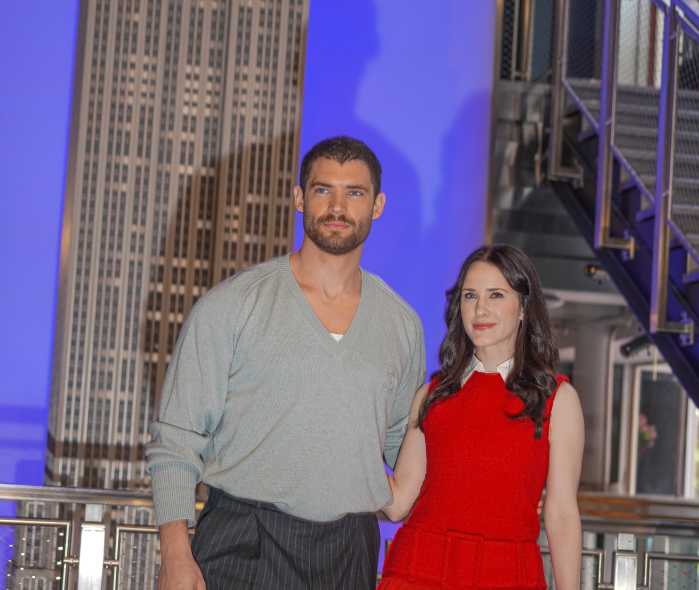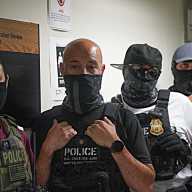By Ed Koch
“W.” (+)
In her Times review, Manohla Dargis correctly described “W.” when she stated:
“Mr. Stone’s take on the president, as comic as it is sincere, is bound to rile ax-grinders of every ideological stripe, particularly those who mistake fiction for nonfiction. History informs its narrative arc from Texas to Iraq, but it should go without saying that this is a work of imagination, a directorial riff on real people and places complete with emotion-tweaking music cues, slo-mo visuals and portentous symbolism. It says nothing new or insightful about the president, his triumphs and calamities.”
The docudrama covers George W. Bush’s life in Texas, his presidential years and, in particular, the war against Iraq. Those who dislike Bush will love this movie. Others, like myself, who really like him as a person and admire his willingness to stand up to Islamic terrorism while disagreeing with him on every domestic issue, will find the film unfair. I supported George Bush in his fight against Islamic terrorism which has as its goal the destruction of western civilization and the conversion, payment of tribute, or death of every Christian and Jew in the world.
George W. Bush is played extremely well by Josh Brolin. Similarly so, Bruce McGill portrays George Tenet, and Thandie Newton plays Condoleezza Rice. Other actors include Elizabeth Banks (Laura Bush), Ellen Burstyn (Barbara Bush), James Cromwell (George H.W. Bush), Richard Dreyfuss (Dick Cheney), Scott Glenn (Donald Rumsfeld), Toby Jones (Karl Rove), Stacy Keach (Earle Hudd) and Jeffrey Wright (Colin Powell).
The portrayal of Rice in the script as an unintelligent member of the cabinet is outrageous, and I was shocked by the deliberate desire of Stone to portray Barbara Bush as a coarse woman. I knew Barbara Bush when I was mayor. While she was a loyal Republican supporter, I and the people I know found her to be a refined, caring, and intelligent woman admired by most Americans. Dick Cheney is depicted as evil in the film. When I served with him in Congress, he was highly regarded on both sides of the aisle. Interestingly, most but not all lawsuits brought against him in his capacity as vice president or defender of government policies have been won by the government.
When I decided to support the reelection of George W. Bush, I stated publicly that I did not agree with him on a single domestic issue. However, I believed that his willingness to fight Islamic terrorism trumped all other issues, and I have no regrets for having taken that position.
In the current presidential election, I first supported Hillary Clinton. After she lost the primary, I announced my support of Barack Obama. He and the Democratic Party understand the danger of Islamic terrorism, and the Democrats are head and shoulders better than the Republicans on domestic issues, e.g., abortion, gay rights, taxes, social security, and privacy which are once again issues of equal importance, as the wars in Iraq and Afghanistan draw down.
Regardless of how you feel about George W. Bush’s presidency, the film provides an appreciation of the artistry of its director, Oliver Stone. Stone does not totally vilify Bush but comes close. Those who decide to see the movie, bearing in mind that it is fiction, are in for an interesting drama. Stone’s belief as depicted in the film engages in a Freudian explanation of Bush’s actions: his resentment of his father’s preference for his other son, Jeb, who became the governor of Florida. While the president is at an all time low in popularity, probably under 30 percent, I believe history will redeem him as it did Harry Truman who was despised when he left office.
HS said: “I enjoyed the film more than I thought I would. Before seeing it, I assumed it would be a hatchet job on history, as Oliver Stone’s earlier movie, ‘JFK,’ turned out to be. The best line about that movie came from a Times critic who wrote, in paraphrase, ‘If Lyndon Johnson and hundreds of others conspired to murder JFK, why didn’t they just knock off Oliver Stone to prevent this movie from being made. It would have been much easier, and it would have prevented their assassination plot from being exposed.’
“Although ‘W.’ was clearly uncomplimentary, it did not present President Bush as an evil person. Three characters are treated very favorably, President Bush 41, Laura Bush and Colin Powell. Cheney and Rumsfeld are stock villains, and Tenet is a dope. W. is portrayed as decent but over his head. His life is depicted from frat-boy antics at Yale to the Presidency. The film purports to be an inside look. We have no idea what is true and what is made up, but the overall picture is credible, in that it coincides with what we have read, and is not as harsh on W. as the Move.ong crowd would desire.
“I would recommend this movie to people interested in current affairs and family drama. Just don’t believe everything you see.”



























